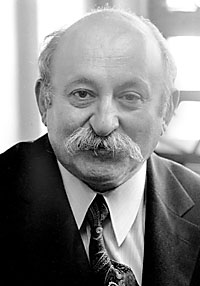 | Sebastian Konstantinovich Shaumyan |
Sebastian Konstantinovich Shaumyan, professor emeritus of linguistics, died in London on Jan. 21 at the age of 90.
Shaumyan was born in 1916 in Tblisi, the Russian province of Georgia, where many Armenians had settled after escaping from the Turkish massacres of earlier generations. His father was a bookkeeper. His uncle, Stephen Shaumyan, joined with Lenin during the Revolution in World War I, and in 1918, became provincial governor of the Bolshevik government at Baku. Anti-revolutionary forces captured and executed him later that year.
Sebastian Shaumyan, more interested in scholarship than politics, attended Tbilisi University, where he studied philology. In 1941, with the outbreak of World War II, he left to join the Russian Army and served until 1953. He saw action in the Crimea during the Nazi invasion and later was assigned to an administrative office in Moscow with the rank of lieutenant-colonel. He managed to combine the army with graduate study, writing his dissertation and receiving his doctorate in 1950.
After being discharged from the army in 1953, he spent the next 20 years teaching and doing research in linguistics at the Academy of Science and Moscow University. He espoused modern scientific methods in linguistics, the branch known as structural linguistics -- an approach initiated by Ferdinand de Saussure and developed by the Prague School.
His research in this area culminated in 1965 with the publication of "Structural Linguistics." In the same year he founded the Section of Structural Linguistics at the Institute of Russian Language, part of the Academy of Science in Moscow.
In 1975 Shaumyan joined the Yale Department of Linguistics, where he developed a linguistic approach called applicational grammar. He expanded this linguistic view in "Applicational Grammar as a Semiotic Theory of Natural Language" (1975) and in "A Semiotic Theory of Language" (1987). After his retirement from Yale in 1987, Shaumyan remained active in the field. His final book, "Signs, Mind and Reality," was published in 2006. His later work is marked by a broad interest in the philosophy of science, in foundational questions of linguistics and in related but separate studies of consciousness theory and neurolinguistics.
He is survived by his second wife, Maria, and their three children.
T H I S
In Memoriam:
Sebastian Konstantinovich Shaumyan: Theoretical linguist W E E K ' S
W E E K ' S S T O R I E S
S T O R I E S![]()
 Symposium will consider future of India-U.S. relations
Symposium will consider future of India-U.S. relations![]()
![]()
 True potential for reform in China to be explored
True potential for reform in China to be explored![]()
![]()
 Symposium, workshop look at Korean film, refugee crisis
Symposium, workshop look at Korean film, refugee crisis![]()
![]()
 Scholars to debate best way to preserve 'global past'
Scholars to debate best way to preserve 'global past'![]()
![]()
 Yale applauds award-winning robotics team from city school
Yale applauds award-winning robotics team from city school![]()
![]()
 Chubb Fellowship hosts visit by 'America's greatest living composer'
Chubb Fellowship hosts visit by 'America's greatest living composer'![]()
![]()
 Theater artists and scholars to honor legacy of playwright August Wilson
Theater artists and scholars to honor legacy of playwright August Wilson![]()
![]()
 Library exhibit showcases books that feature images of trees
Library exhibit showcases books that feature images of trees![]()
![]()
 Award supports research on use of nanoparticles to treat prostate cancer
Award supports research on use of nanoparticles to treat prostate cancer![]()
![]()
 Carbon dioxide levels have affected Earth's climate for . . .
Carbon dioxide levels have affected Earth's climate for . . .![]()
![]()
 Exhibit on creation of city's Holocaust memorial features . . .
Exhibit on creation of city's Holocaust memorial features . . .![]()
![]()
 Shlomchik receives award for his research on memory T-cells
Shlomchik receives award for his research on memory T-cells![]()
![]()
 Two Yale researchers receive Donaghue Investigator Awards
Two Yale researchers receive Donaghue Investigator Awards![]()
![]()
 Symposium to showcase 'Next Generation of Legal Scholarship'
Symposium to showcase 'Next Generation of Legal Scholarship'![]()
![]()
 'Donate Life Week' seeks to raise awareness for organ donation
'Donate Life Week' seeks to raise awareness for organ donation![]()
![]()
 In Memoriam: Sebastian Konstantinovich Shaumyan
In Memoriam: Sebastian Konstantinovich Shaumyan![]()
![]()
 Yale Books in Brief
Yale Books in Brief![]()
![]()
 Campus Notes
Campus Notes![]()
Bulletin Home |
| Visiting on Campus
Visiting on Campus |
| Calendar of Events
Calendar of Events |
| In the News
In the News![]()
Bulletin Board |
| Classified Ads
Classified Ads |
| Search Archives
Search Archives |
| Deadlines
Deadlines![]()
Bulletin Staff |
| Public Affairs
Public Affairs |
| News Releases
News Releases |
| E-Mail Us
E-Mail Us |
| Yale Home
Yale Home